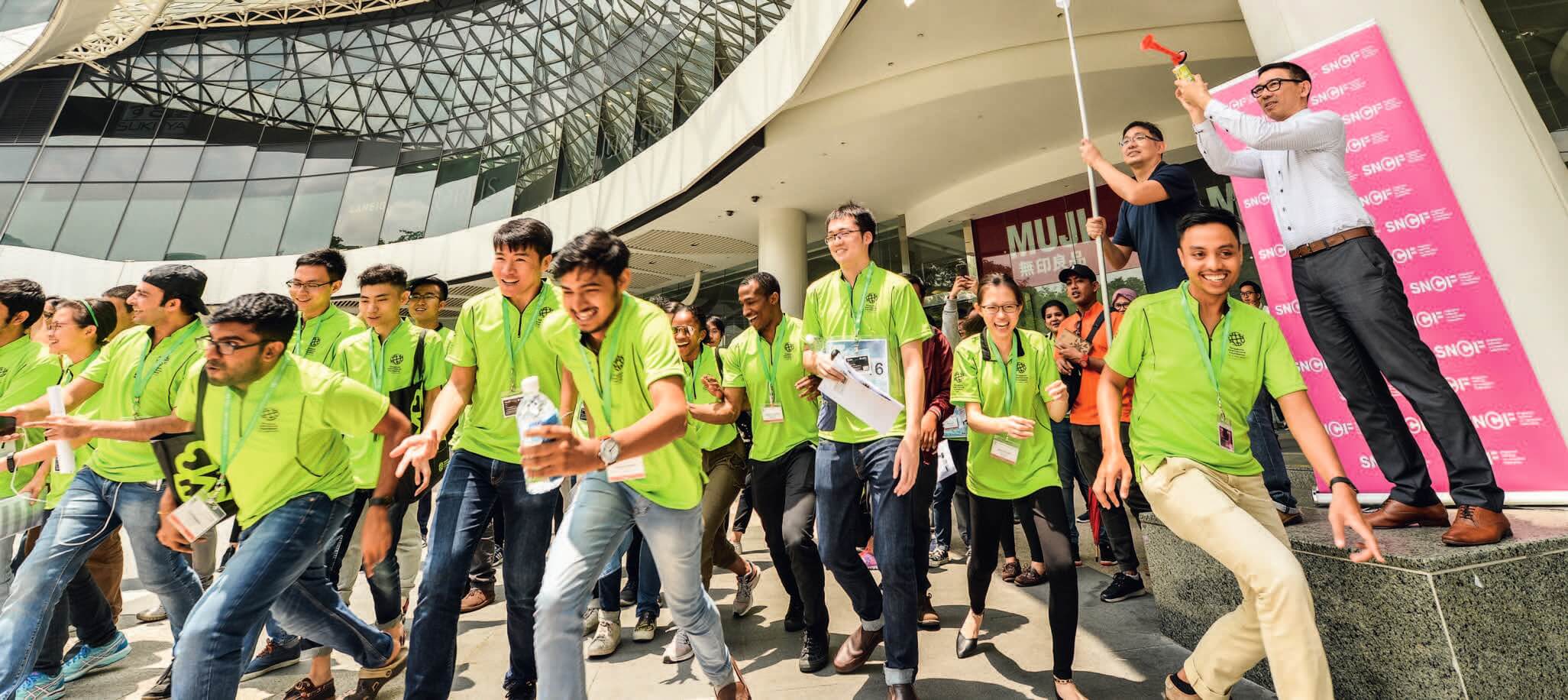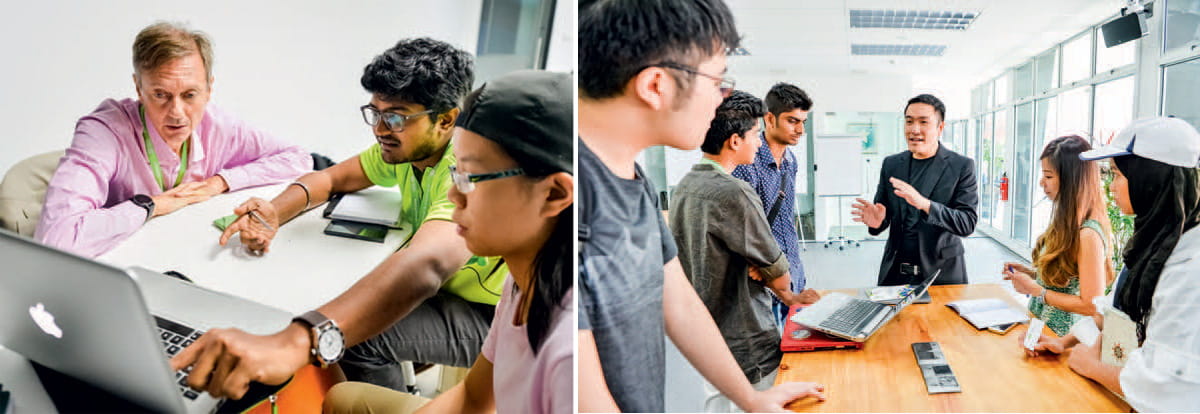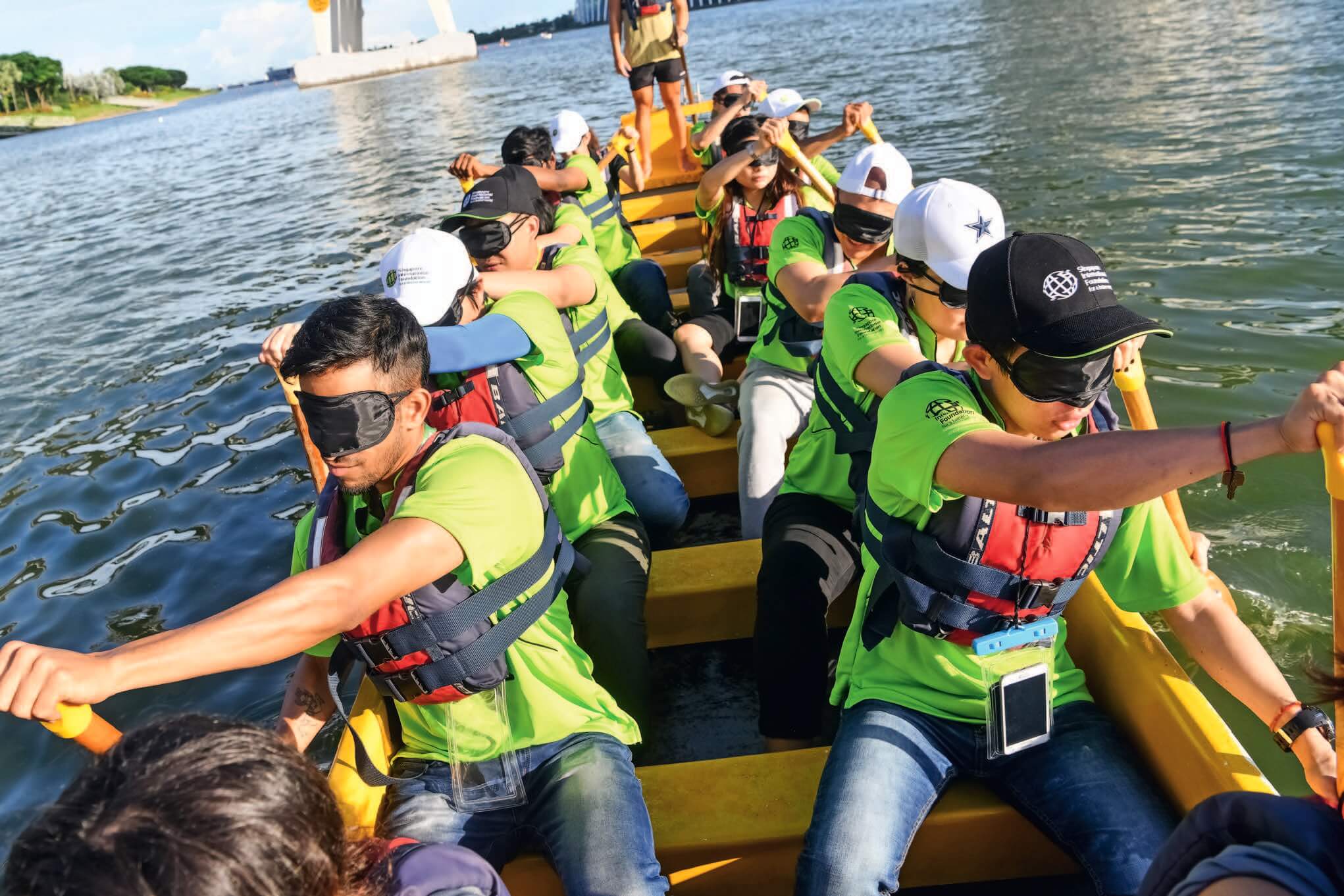Stories > World of Good
World of Good
Global young changemakers get much food for thought on how to solve pressing social issues while sustaining their business ventures.
BY LEDIATI TAN & KOH HUI THENG
PHOTOS SIF
ome October, excitement will once again be thick, as budding social entrepreneurs from around the world gather in Singapore to pitch their business ideas after an eight-month journey of discovery.
From helping Indian villagers access vital information through solar-powered mobile smart kiosks to empowering dairy farmers in rural Bhutan with a financial supply chain, they have big dreams to positively change the lives of their fellow men.
The Pitching For Change event, organised by the Singapore International Foundation (SIF), began in March and is part of SIF’s annual Young Social Entrepreneurship (YSE) programme, which aims to inspire, equip and enable young changemakers to build social enterprises.

The 16 shortlisted teams with judges from the YSE 2018 Workshop. BELOW: Participants at the start of the SCOOP trail, a tech-based race that took them to different cooperatives around Singapore.
EMBRACING TECHNOLOGY FOR GOOD
Kicking off this year’s programme was a four-day workshop, highlighted by a fireside chat on how to leverage blockchain technology – a digitised, decentralised public ledger used in cryptocurrency transactions – to create long-term social impact.
“You can grow your community into a telegram group of 5,000 or 10,000 people who are all invested to help you succeed,” says panellist Dorjee Sun, who is also chief operating officer of crypto market analysis platform Santiment.net. With examples given from around the world, participants were challenged to think about how to utilise technology to power their own social enterprises.
For instance, Karen Teoh, chief operating officer of blockchain-based trade finance start-up Kommerce, shared how her work improved the income and livelihood of owners of small- and medium-sized businesses in East Africa by providing them access to capital markets through blockchain technology.
Participants also received guidance and mentoring from experienced business professionals – one of whom is AJ Boelens, director of strategy and insights at multinational media company The Economist. “My teams had no commercial experience at all, so I could really help them focus on the critical areas,” he says.
GUIDANCE ON THE GROUND
At the end of the workshop, 16 teams were shortlisted to take part in an eight-month-long incubation programme, supported by international management consultancy McKinsey & Company and Singapore investment company Temasek International, among others.
In June, participants undertook an experiential study visit – the first of its kind to be held in Singapore following stints in India and Malaysia the previous years. The budding social entrepreneurs went through a week-long boot camp of rigorous workshops, group mentorship sessions and visits to Singapore social enterprises.
ON THE RIGHT TRACK
The 16 shortlisted teams for the Young Social Entrepreneurs (YSE) 2018 programme share their thoughts on their YSE journey thus far.
“The YSE Programme Represents A Great Effort To Bring Together People Who Share A Passion For Contributing To Social Good.”
Nam Dang, Cricket One
Cricket One aims to produce a sustainable and affordable source of food for the future by developing technologies to rear crickets on agricultural by-products in Vietnam.
“What Weʼve Found The Most Helpful From The Programme Were The Insights On Business Strategy Offered By Our Mentor, Who Has More Than 40 Years Of Experience In The Industrial Automation Industry.”
Azmi Roqi, Elvish
Elvish hopes to improve the standards of living of Indonesian fishermen, and decrease their operational costs by converting old diesel motors on their boats into solar-powered electric ones.
“I Learnt How To Pitch, As Well As What Matters In Business Planning And Creating Social Impact.”
Muhammad Ansari, Everybody Eats
Everybody Eats is a food delivery service in New York, USA that aims to fight hunger and reduce food waste. It adopts a one-for-one business model in which every meal ordered through its platform will help subsidise the cost of a meal for someone in need.
“The Key Strength Of The Yse Programme Lies In Its Ability To Bring A Diverse Group Of People Together And Come Up With Unique Solutions To Various Social Issues.”
Samyak Jain, Involve
Involve hopes to create an accessible ecosystem for students and peer teaching. It also offers affordable after-school academic support to low-income students.
“The YSE Programme Is A Unique Idea To Inspire, Nurture And Empower Young Entrepreneurs To Build A Better World Through Connecting With People From All Over The World.”
Kieng Lyheang, Kon Chhlat
Based in Cambodia, Kon Chhlat aims to provide children with affordable instant porridge made from natural ingredients.
“Through The YSE Workshop, I Gained New Perspectives On How People From Around South-east Asia Deal With Problems.”
Tanvi Mittal, Greennovations
Kenya-based Greennovations aims to eliminate plastic waste from the environment by transforming them into high-utility products. Their sales revenue will be used to improve the wages of waste collectors.
“It Is Encouraging To Know That There Are Other Like-minded Youth Out There Who Want To Make A Positive Impact And Do Good.”
Aminur Rasyid Mohamed Anwar, Junior Art Lab
Junior Art Lab is a Singapore-based edu-tech social enterprise that creates unique learning experiences, nurtures creative confidence, and empowers learners through art, design and technology.
“The YSE Programme Brings Together People Of Different Cultures – We Are All Committed To Changing The World.”
Vishnu Harikumar, Manram
Manram produces a gluten-free snack using millet acquired at a fair price from farmers in rural India. It provides the farmers with access to equipment, training and technology.
“I Have Been Able To Connect With Founders Of Other Social Enterprises That Are Also Tackling Issues Related To Food Production And Hear About Their Experiences.”
Sherab Dorji, Khemdro Dairy
Khemdro Dairy hopes to empower smallholder dairy farmers in rural Bhutan by creating a supply chain that delivers strong financial returns to member farmers. It also provides grants and microcredit to member farmers to invest in local dairy development programmes.
“It Is Crucial For Social Entrepreneurs To Be Equipped With Sound FInancial Understanding And The Right Tools That Will Ensure The Sustainability Of Our Startups. YSE Is The Only Boot Camp I Have Experienced That Provides Us With Such Training.”
Zenna Law, Pinkcollar
Pinkcollar aims to provide ethical work arrangements for domestic workers in South-east Asia by helping to match them to potential employers through its website and mobile app.
“Previously, I Only Saw Singapore As A World Trading Hub. But Now I See Its Various Efforts To Solve The Worldʼs Social Problems.”
Gilang Indy Ashari, Musimpanen Indonesia
Musimpanen Indonesia is an agricultural startup focused on transforming low-value commodities such as corn into valuable goods, while ensuring environmental sustainability.
“It Was An Amazing Experience To Be Able To Make Friends With People From 12 Countries And Territories. I Got To Learn So Many Things From Them, And Share My Culture With Others.”
Ly Sophea, Scan Book
Cambodia-based Scan Book hopes to create an app that scans images in high school textbooks and links them to educational resources on the Internet, such as videos and 3-D models, to help students.
“The Knowledge, New Friends And Experience Gained From The YSE Programme Will Be A Pivotal Turning Point For Our Social Enterprise.”
Marissa Asfirah, Project Paplet
Project Paplet aims to reduce paper wastage by collecting sheets of paper that have been printed on one side from institutions and local businesses, and compiling them into booklets that are then sold to interested parties or distributed to the less fortunate in Malaysia.
“The YSE Programme Provides An Important Opportunity For Us To Meet People From Different Countries Who Are Able To Offer Fresh Perspectives And Mindsets On Social Enterprise.”
Ho Jing En, The Kisan Union
The Kisan Union is developing a solar-powered mobile smart kiosk to help people in rural India access information about government policies, as well as e-governance and health services.
“One Of The Key Takeaways From The Workshop Is That As Entrepreneurs, We Should Be Confident And Comfortable With Sharing Our Ideas, Even If They Are Still In Their Infancy.”
Tylor Jong Kai Jie, TreeDots Enterprise
TreeDots Enterprise hopes to reduce food waste in Singapore by creating a business-to-business marketplace for food suppliers – to sell their unsold inventory at a discounted price to food and beverage businesses.
“One Of The Main Bottlenecks In Our Operations Was Sourcing For Fresh Produce From Different Suppliers At Various Locations, Which Increased Our Transportation And Manpower Costs. With This Collaboration, We Can Now Focus More On Food Innovation And Operations.”
Yeo Pei Shan, Augustine Tan Jun Hui and Lee Zhong Han, UglyFood
Singapore-based UglyFood buys edible produce that would have been discarded for not meeting aesthetic standards from fresh produce retailers, and transforms them into food items such as cold-pressed juices and popsicles.

The young changemakers find out how to make their businesses sustainable in a session on financial modelling; YSE team The Kisan Union learning how to strengthen their social enterprise model at a business clinic.
They gained practical tips on how to run their businesses on subjects like financial modelling and entrepreneurial resilience, conducted by key players from across the Singapore social entrepreneurial landscape.
“It’s important for social entrepreneurs to think things through and get the fundamentals right,” says Wesley Wong, a mentor from social entrepreneur academy UNFRAMED, who shared advice on business profitability. “It’s only by having a sustainable business model that you can have a business to do good.”
Nicholas Lim, co-founder of TreeDots Enterprise, attests to the usefulness of such guidance. “Our mentor from UNFRAMED equipped us with tools to make our business models and financial statements more organised,” he says.
Participants also learnt how to identify the right funding source based on the stage of their company’s growth. “At the social enterprise’s early stages, rather than approach impact investors who expect financial repayment, why not seek long-term capital, like grants?” shares Kevin Teo, the managing director at Asian Venture Philantropy Network’s Knowledge Centre.
Support was also forthcoming from fellow YSE alumni. YSE 2014 winner Society Staples – a Singapore social enterprise that aims to empower people with disabilities through fitness – gamely held a Blind and Deaf Dragons training for this year’s participants at the Marina Reservoir. The three-hour session comprised typical dragon boating activities with a twist: The youths were made to row blindfolded, communicating with each other only through the beating of their paddles.

Participants learn the importance of communication and team work in a dragon boating session with a twist.
And true to the collaborative spirit of SIF, the youths found commonality and encouragement from the diverse experiences of their counterparts.
“Being exposed to people from different backgrounds has helped me to be more tolerant. It has also allowed me to appreciate their mindsets and different approaches when working together,” says Hu Jing En, co-founder of The Kisan Union.
YSE AT A GLANCE
from 16 teams representing eight countries were shortlisted for the finals of the YSE programme 2018.
in seed funding to be received by the top six teams with the best ideas to launch or scale up their social enterprise.
Thatʼs where the 870-strong YSE alumni network has been collectively launched since the YSEʼs inception in 2010.
of shortlisted teams from the YSE programme are still in operation today.
